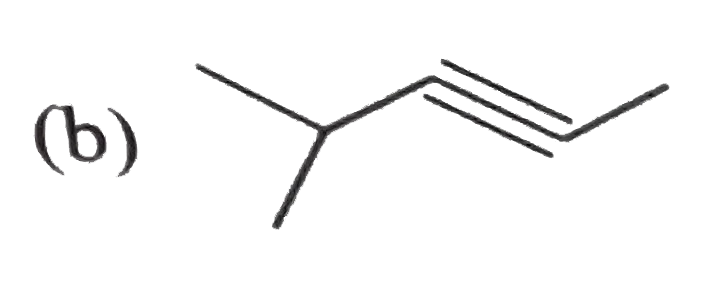Amongest the following compounds, the one which would not form a white precipitate with ammonical silver nitrate solution is
HC≡CH
H3C−C≡C−CH3
H3C−C=CH
CH3CH2CH2C≡CH
The correct Answer is:B
To solve the question regarding which compound does not form a white precipitate with ammonical silver nitrate solution, we can follow these steps:
Step 1: Understand the Reaction
Ammonical silver nitrate (AgNO3 in ammonia) is known to react with terminal alkynes to form a white precipitate of silver acetylide. Non-terminal alkynes do not react in the same way and do not form this precipitate.
Step 2: Identify the Types of Alkynes
- Terminal Alkynes: These have a triple bond at the end of the carbon chain (e.g., ethyne or propyne).
- Non-terminal Alkynes: These have a triple bond somewhere in the middle of the carbon chain (e.g., butyne).
Step 3: Analyze the Given Compounds
Assuming the question provides a list of compounds, we need to categorize each compound as either a terminal alkyne or a non-terminal alkyne.
Step 4: Determine the Precipitate Formation
- For each terminal alkyne, a white precipitate will form when treated with ammonical silver nitrate.
- For each non-terminal alkyne, no white precipitate will form.
Step 5: Identify the Correct Answer
From the analysis, the compound that is a non-terminal alkyne will be the one that does not form a white precipitate with ammonical silver nitrate.
Conclusion
The compound that does not form a white precipitate with ammonical silver nitrate is the non-terminal alkyne (option 2).
---
Ammonical silver nitrate (AgNO3 in ammonia) is known to react with terminal alkynes to form a white precipitate of silver acetylide. Non-terminal alkynes do not react in the same way and do not form this precipitate.
- Terminal Alkynes: These have a triple bond at the end of the carbon chain (e.g., ethyne or propyne).
- Non-terminal Alkynes: These have a triple bond somewhere in the middle of the carbon chain (e.g., butyne).
Assuming the question provides a list of compounds, we need to categorize each compound as either a terminal alkyne or a non-terminal alkyne.
- For each terminal alkyne, a white precipitate will form when treated with ammonical silver nitrate.
- For each non-terminal alkyne, no white precipitate will form.
From the analysis, the compound that is a non-terminal alkyne will be the one that does not form a white precipitate with ammonical silver nitrate.
The compound that does not form a white precipitate with ammonical silver nitrate is the non-terminal alkyne (option 2).
Topper's Solved these Questions
- GENERAL ORGANIC CHEMISTRYBOOK - ERRORLESS CHAPTER - GENERAL ORGANIC CHEMISTRYEXERCISE - Dipole moment, resonance and reaction intermediates
73 Videos
- GENERAL ORGANIC CHEMISTRYBOOK - ERRORLESS CHAPTER - GENERAL ORGANIC CHEMISTRYEXERCISE - Organic reactions and their mechanism
67 Videos
- GASEOUS STATE BOOK - ERRORLESS CHAPTER - GASEOUS STATE EXERCISE - JEE SECTION JEE (Advanced) 2018 Numeric answer type question
1 Videos
- HALOGEN CONTAINING COMPOUNDBOOK - ERRORLESS CHAPTER - HALOGEN CONTAINING COMPOUNDEXERCISE - Critical Thinking (Jee (Advanced) 2018)
1 Videos
Similar Questions
Knowledge Check
Which compound does not give precipitate with ammonical silver nitrate solution ?
AC2H5−C≡CHBCH3−C≡C−CH3CCH3−CH3| C H−C≡CHDPh−CH2−C≡CHWhich one of the following will not goves white precipitate with ammonical silver nitrate solution ?
ACH3−C≡C−CH3BCH3−CH∣CH3−C≡Ch3CCH3CH=ODall of theseWhich of the following will not give white precipitate with ammoniacal silver nitrate solution ?
ACH3−C≡C−CH3B C
C D
D
Which one of the following will not give white precipitate with ammonical silver nitrate solution
View SolutionAmmonical silver nitrate reacts with
View SolutionWhich of the following will not react with an ammonical silver nitrate solution :
View SolutionAcetylene reacts with ammonical silver nitrate to form
View SolutionWhen formic acid is treated with ammonical silver nitrate it forms :
View Solution
